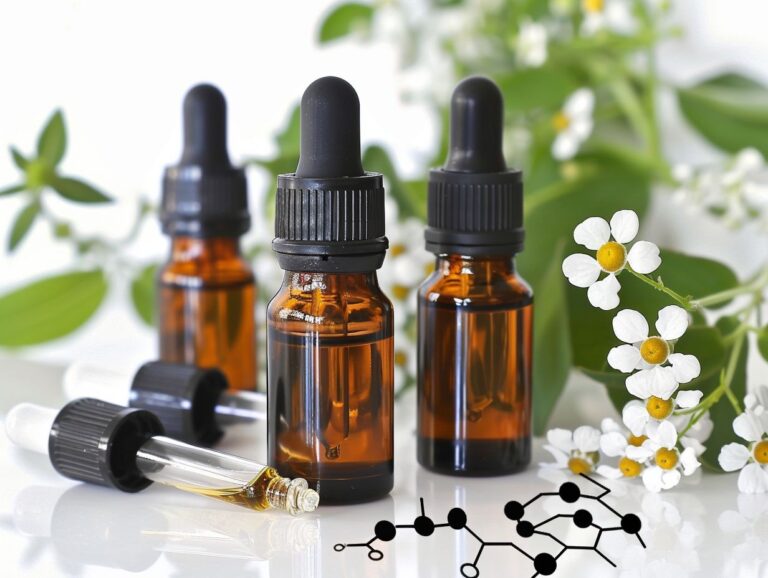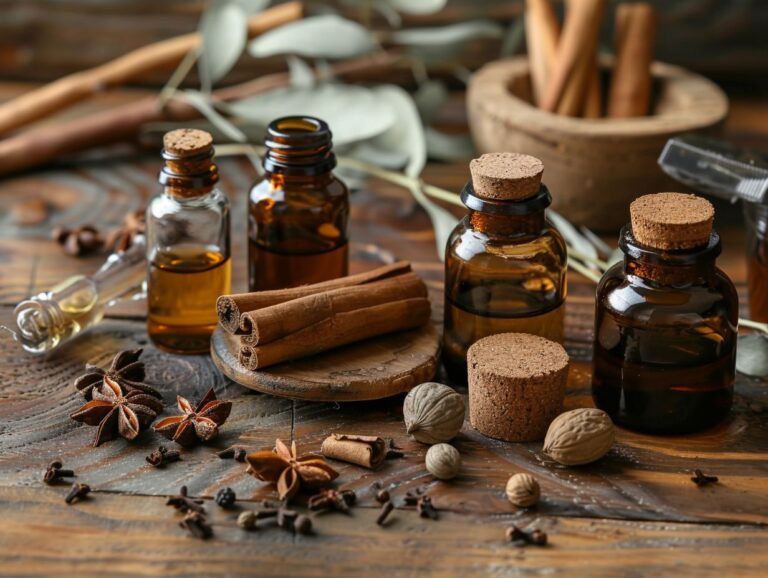Are Essential Oils Good for Sunburn
Essential oils have gained popularity for their various benefits, including their potential healing properties. Sunburn, a common skin condition, can be uncomfortable and painful. This article will explore the causes and symptoms of sunburn, as well as how essential oils can help provide relief. We will also discuss the best essential oils for sunburn, how to use them safely, and when it may be necessary to seek medical attention. We will cover tips for preventing sunburn and protecting your skin from the sun’s harmful rays. Let’s dive in and discover how essential oils can be a natural remedy for sunburn.
Key Takeaways:
What Are Essential Oils?
Essential oils are highly concentrated plant extracts that retain the natural aroma and flavor of their source. These oils are extracted from various parts of plants like flowers, leaves, seeds, roots, and bark through processes like distillation or cold pressing.
Historically, essential oils have been used for centuries in traditional medicine and skincare practices due to their therapeutic properties. The extraction methods play a crucial role in preserving the volatile compounds that contribute to their fragrant nature and potential health benefits. Distillation involves steam passing through plant material, capturing the essential oil, while cold pressing extracts oils by mechanical pressure. These pure oils are then used in skincare products, aromatherapy diffusers, and massage oils for their nourishing, calming, and rejuvenating effects on the skin and overall well-being.
What Are the Benefits of Essential Oils?
The benefits of essential oils extend beyond their pleasing scents to include potential health benefits backed by scientific studies. These oils possess various properties like antibacterial, antioxidant, anti-inflammatory, and more.
Essential oils are known for their ability to alleviate stress and anxiety due to their calming effect on the mind and body. Certain oils like lavender and chamomile have been studied for their potential to improve sleep quality and aid in relaxation. These natural extracts are popular in aromatherapy, a holistic treatment that involves inhaling the aromatic compounds to promote overall well-being.
Do Essential Oils Have Healing Properties?
Essential oils are known for their healing properties that have been the subject of ongoing research to understand their efficacy in promoting skin health and overall well-being.
Studies have shown that certain essential oils, such as lavender and tea tree oil, possess antimicrobial and anti-inflammatory properties that make them ideal for treating various skin conditions, ranging from acne and eczema to wound healing. The therapeutic benefits of essential oils extend beyond skincare, with aromatherapy using oils like peppermint or eucalyptus to promote relaxation and reduce stress. Holistic practices often incorporate these oils for their potential to enhance mental and emotional well-being, providing a natural alternative to conventional treatments.
What Are the Causes of Sunburn?
Sunburn occurs when the skin is overexposed to ultraviolet (UV) radiation from the sun or artificial sources like tanning beds. The UV rays damage the DNA in the skin cells, triggering inflammation and pain.
UV radiation, specifically UVB and UVA rays, penetrates the outer layer of the skin, causing a cascade of molecular reactions within the cells. UV radiation targets the DNA of skin cells, leading to mutations and cellular damage. As a result, the skin cells release chemical signals that promote inflammation, causing blood vessels to dilate and the skin to become red and painful.
What Are the Symptoms of Sunburn?

These symptoms are often accompanied by skin that is sensitive to touch, with a stinging or burning sensation. The affected area may also become swollen and develop a tight, dry appearance. Sunburn can lead to the skin peeling as it heals, revealing a new layer underneath.
It is crucial to hydrate and apply soothing ointments to help alleviate discomfort and aid in the healing process. In severe cases, sunburn can cause flu-like symptoms, such as fever, chills, and nausea, which may require medical attention.
How Can Essential Oils Help with Sunburn?
Essential oils can provide relief and aid in the treatment of sunburned skin due to their soothing and healing properties. When properly diluted with a carrier oil, these oils can reduce inflammation and moisturize the affected area.
Some of the most effective essential oils for sunburn relief include lavender, chamomile, peppermint, and tea tree oil. Lavender oil, known for its calming scent, can help alleviate pain and redness associated with sunburns. Chamomile oil possesses anti-inflammatory properties that can reduce swelling and irritation. Peppermint oil offers a cooling sensation that can soothe the burning sensation of sun-exposed skin. Tea tree oil is renowned for its antibacterial qualities, which can help prevent infections in sunburned areas.
When using essential oils for sunburn relief, it is crucial to dilute them properly to avoid skin irritation. A common dilution ratio is 2-3 drops of essential oil per teaspoon of carrier oil, such as coconut or almond oil. This mixture should be gently applied to the affected area using a cotton ball or soft cloth. Reapply every few hours as needed until the sunburn symptoms subside.
What Are the Best Essential Oils for Sunburn?
In terms of treating sunburn with essential oils, popular choices include peppermint oil, chamomile oil, lavender oil, tea tree oil, geranium oil, and eucalyptus oil, each offering unique properties for skin relief.
Peppermint oil is known for its cooling sensation that can help soothe the heat and discomfort of sunburned skin.
Chamomile oil has anti-inflammatory properties, reducing redness and irritation.
Lavender oil promotes skin regeneration and has a calming effect.
Tea tree oil is antimicrobial, preventing infections in damaged skin.
Geranium oil aids in cell regeneration and balances sebum production.
Eucalyptus oil has antiseptic properties that support skin healing.
How to Use Essential Oils for Sunburn Relief?
To use essential oils for sunburn relief, it is crucial to dilute them with a carrier oil like coconut oil or aloe vera gel to prevent skin irritation.
When dealing with sunburn, the use of essential oils can provide significant relief due to their anti-inflammatory and healing properties. Mixing a few drops of lavender oil or peppermint oil with a carrier oil acts as a natural remedy to calm the skin.
- Ensure the essential oil concentration in the mixture is between 1-2% to avoid adverse skin reactions, especially for those with sensitive skin.
- Remember, consistency is key. Applying the diluted blend multiple times a day can help speed up the healing process.
It’s also essential to perform a patch test before widespread application to check for any allergic reactions. The gentle application of the oil mixture using soft, circular motions aids in quick absorption and relief without further aggravating the sunburned skin.
Are Essential Oils Safe to Use for Sunburn?
While essential oils offer natural sunburn relief, it is essential to use them safely by diluting them appropriately and conducting a patch test to check for potential skin reactions. Like any skincare product, essential oils may have side effects if not used correctly.
Essential oils are highly concentrated plant extracts, and their potency can cause adverse effects if applied undiluted. Always mix essential oils with carrier oils like coconut or almond oil before directly applying them to the skin.
It’s important to note that some essential oils are photosensitive, meaning they can increase skin sensitivity to sunlight, potentially worsening sunburn. Be cautious when using citrus oils like bergamot or lemon on sun-exposed skin.
Always store essential oils in dark, cool places to prevent them from going rancid and losing their efficacy.
Are There Any Side Effects of Using Essential Oils for Sunburn?

Although essential oils are generally safe, some individuals may experience side effects such as skin irritation or allergic reactions, especially if the oils are not properly diluted. It’s important to be mindful of any antimicrobial properties in the oils that may affect sensitive skin.
When using essential oils for sunburn, it is crucial to dilute them appropriately to avoid potential skin issues. Undiluted oils can be too potent and may cause adverse reactions. Skin testing before applying a new essential oil can help identify any possible sensitivities. Certain essential oils, due to their high antimicrobial properties, can be harsh on delicate or sun-damaged skin. Therefore, always blend oils with a carrier oil before topical application to minimize the risk of irritation.
How Can You Prevent Sunburn?
Preventing sunburn involves taking proactive measures to shield the skin from harmful UV radiation. This includes using sunscreen, seeking shade, wearing protective clothing, and avoiding direct sun exposure during peak hours.
It’s not just about sunscreen; one must also remember to reapply it every two hours, especially after swimming or sweating. Sun safety practices extend beyond just using sunscreen — donning a wide-brimmed hat to protect the face and neck, sunglasses to shield the eyes from UV rays, and seeking shade under trees or umbrellas all play crucial roles in sunburn prevention. Being aware of the UV index and planning outdoor activities accordingly can significantly reduce the risk of sunburn and potential skin damage.
What Are the Best Sunscreen Options for Sunburn Prevention?
Choosing the right sunscreen is crucial for effective sunburn prevention. Look for broad-spectrum sunscreens with a high SPF (Sun Protection Factor) to shield your skin from harmful UV rays and reduce the risk of skin cancer.
When selecting a sunscreen, consider your skin type and the expected sun exposure. For oily or acne-prone skin, opt for oil-free or non-comedogenic formulas to prevent breakouts. Water-resistant sunscreens are ideal for outdoor activities or swimming.
Remember to apply sunscreen generously at least 15 minutes before going outside and reapply every two hours, especially after swimming or excessive sweating. A shot glass full of sunscreen is a good rule of thumb for full-body coverage.
Don’t forget often overlooked areas like ears, lips, and the tops of your feet. Lip balms with SPF protection are essential for preventing sunburn on your lips.
What Are Other Ways to Protect Your Skin from the Sun?
Along with sunscreen, you can protect your skin from the sun by wearing hats, sunglasses, and protective clothing. Natural remedies like aloe vera gel and oatmeal baths can also provide relief for sun-exposed skin.
Wearing a wide-brimmed hat can shield your face, neck, and ears from harmful UV rays, while wrap-around sunglasses offer protection to your delicate eye area. Opting for clothing with a tighter weave can act as an additional barrier against the sun’s rays, minimizing exposure to your skin.
In terms of natural remedies, aloe vera is known for its soothing and moisturizing properties, making it ideal for alleviating sunburn discomfort. Oatmeal, on the other hand, can help calm irritated skin and reduce inflammation, making it a great choice for soothing sun-damaged areas.
When Should You See a Doctor for Sunburn?
If severe sunburn symptoms persist or lead to complications like blistering, fever, or infection, it is advisable to consult a dermatologist for further evaluation and treatment. Seeking medical attention is crucial for addressing any potential skin issues.
While mild sunburns can often be managed at home with soothing remedies and adequate hydration, more serious cases may require professional medical intervention. Dermatologists are experts in assessing and treating various skin conditions, including sunburns that have escalated to a severe stage.
When sunburn symptoms extend beyond redness and minor discomfort, individuals may experience intense pain, itching, or even the formation of blisters. In such instances, a dermatologist can provide specialized care to alleviate pain, prevent infection, and promote optimal healing.
Individuals with sensitive skin, a history of skin disorders, or those taking certain medications may be at a a higher risk of complications from sunburn. Dermatologists possess the knowledge and expertise to tailor treatment plans to suit individual skin needs and address any underlying conditions that could exacerbate sunburn effects.
Conclusion

In conclusion, essential oils offer a natural and soothing approach to sunburn relief, harnessing their healing properties to alleviate pain and inflammation. When used correctly and safely, these oils can complement skincare routines and promote overall skin health.
Some essential oils like lavender, chamomile, and tea tree oil possess anti-inflammatory and analgesic properties, which can help reduce redness and discomfort associated with sunburn. Their antioxidant properties aid in repairing damaged skin cells, helping with faster healing and regeneration. The aromatherapy benefits of essential oils also contribute to relaxation and stress relief, further supporting the body’s natural healing processes. When diluted and applied topically, essential oils provide a gentle and fragrant alternative to conventional sunburn treatments.
Frequently Asked Questions
Are Essential Oils Good for Sunburn?
Yes, essential oils can be very beneficial for treating sunburns. They contain natural healing properties that can help soothe and heal the damaged skin.
Which Essential Oils are Good for Sunburn?
Lavender, peppermint, chamomile, tea tree, and eucalyptus essential oils are known to be effective in treating sunburns. They have anti-inflammatory and soothing properties that can help alleviate pain and discomfort.
How Do I Use Essential Oils for Sunburn?
Essential oils can be used topically, either diluted with a carrier oil or added to a cool compress. You can also mix a few drops of essential oil with aloe vera gel for a cooling and healing effect.
Can Essential Oils Help with Sunburn Blisters?
Yes, essential oils can help with sunburn blisters by reducing inflammation and promoting healing. However, it is important to seek medical attention if the blisters are severe or cover a large area of the body.
Are Essential Oils Safe for Sunburn?
Essential oils are generally safe for use on sunburns, but it is important to dilute them properly and do a patch test first to avoid any potential skin irritation. It is also best to consult with a healthcare professional before using essential oils, especially if you have any pre-existing conditions or are pregnant.
How Often Should I Apply Essential Oils for Sunburn?
It is recommended to apply essential oils for sunburn 2-3 times a day or as needed for relief. However, if you experience any adverse reactions, stop using the oils and consult with a healthcare professional.







